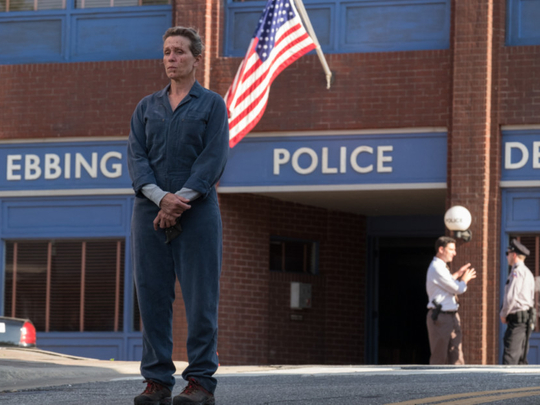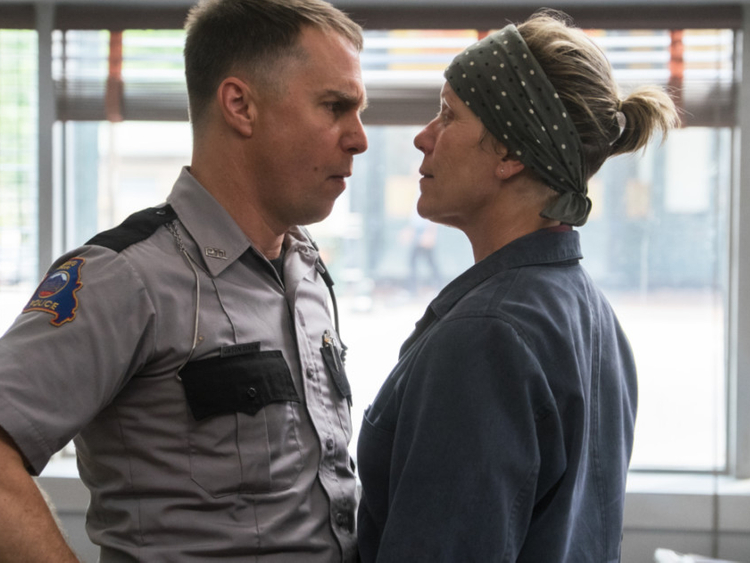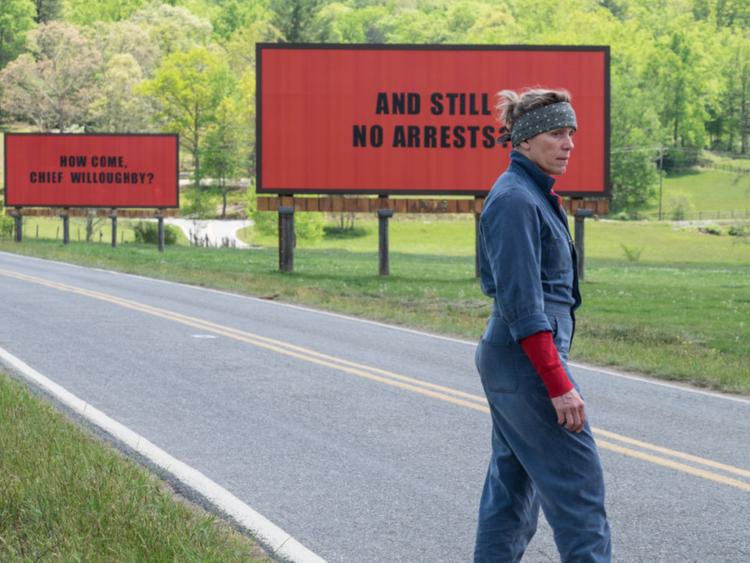
At one point in Three Billboards Outside Ebbing, Missouri, Frances McDormand tears the movie open, showing you what a broken heart looks like.
It happens during an uneasily intimate encounter between her character, a tough number named Mildred, and an ailing police chief, Willoughby (Woody Harrelson). Until then, Mildred has seemed impervious to his pain. She has rented three billboards attacking his failure to solve her daughter’s murder — one reads “Raped While Dying” — and has been so wrapped up in her hurt that she hasn’t seen anyone else’s. When she realises how sick Willoughby is, she looks at him as if for the first time. She’s staggered, and so are you.
The pain of others haunts Three Billboards, at least whenever the writer-director Martin McDonagh lets it. A playwright (The Pillowman) turned filmmaker (In Bruges) who’s somewhat of a subgenre unto himself, McDonagh is a pain artist whose tools include absurd violence, cruel laughs and sucker punches. He skated through his last movie, Seven Psychopaths, a barely there comedy that pivots on a creatively stalled screenwriter. As this precis suggests, McDonagh doesn’t have much to say in that movie — it has a bunny, stolen dogs, guys with guns, good and bad jokes — but what little is said is said by very fine performers grooving on all his words and larky nonsense.
Three Billboards is more ambitious than McDonagh’s earlier features. Like the older ones, it has loads of gab, plenty of guns and the spectacle of men (mainly) behaving terribly. It also restlessly, if not satisfyingly, shifts between comedy and tragedy — a McDonagh speciality — splattering blood along the way. This time, though, he has also given his movie characters instead of disposable contrivances, a plot instead of self-reflexive ideas about storytelling and a rather diffuse overarching metaphor. Mostly, he has freighted it with a tragedy that allows the performers — primarily McDormand but also the equally excellent Harrelson and Sam Rockwell — to play to their range.
The movie opens on low boil with Mildred behind the wheel of her station wagon near three derelict billboards. It’s an inviting landscape smudged with soft colour, but as she stares at the signs with furrowed intensity, she chews on a fingernail so ferociously she seems on the verge of tearing it off. The billboards aren’t blank — the faded image of a baby smiles down from one, the word “life” pops off another — but they’re the opening pages in Mildred’s opus. Stamping black text against a blood-red background, she uses the billboards to announce her crusade while McDonagh (who likes self-aware gestures) lays out the story’s fundamentals: its setting, characters, problem, plot and possible villain.
The billboards are a gimmick for McDonagh and a gambit for Mildred, a way to get things jumping (the investigators, the tale) and splash some foreboding on an outwardly pacific scene. Much of the story involves the ripples of outrage, confusion and buffoonery that the billboards inspire and that soon envelop almost everyone Mildred knows.
Months after her daughter’s death, grief has walled her in; isolating and seemingly impenetrable, it is inscribed in the hardness of her gaze and in her grim new identity as a mother of a dead girl. The billboards turn that grief into a weapon, a means of taking on the law and assorted men — a threatening stranger, a vigilante dentist and an abusive ex (John Hawkes) — who collectively suggest another wall that has closed Mildred in.
McDonagh likes to play comedy against violence and to wring laughs out of the unspeakable. This kind of juxtaposition (in his movies, at any rate) can produce laughter that catches in your throat, giving you pause and maybe provoking thought about why exactly you are giggling.
But he doesn’t always know his A material from his B, or doesn’t care; his jokes can be uninterestingly glib with tiny, bloodless pricks that are less about challenging the audience than about obscuring the material’s cliches and overriding theatricality. Everything fits together too neatly in Three Billboards, even when chaos descends, but the performers add enough rough texture so that it doesn’t always feel so worked.
McDormand roughs it up beautifully. A performer of great unforced naturalism, she has always come across more like a character actor than a star, even when she has the lead. She never seems concerned about losing the audience’s love or its sympathy, which can be thrilling, particularly given that female performers are often asked to pander or seduce. In this movie, she makes pain so palpably all-encompassing that you see it in her character’s every glance and gesture: It squares Mildred’s jaw, hardens her mouth and turns her face to stone, as if she were further fortifying her defences. But pain also makes her ugly, maybe irredeemable, which also makes her joltingly, excitingly human.
That same stone face is good for comedy, too, even if McDonagh’s bids at humour grow progressively less successful. He plays with tones, realisms and ideas in Three Billboards, including the sentimentally redeemed white racist, a character that suggests — despite the rage and invective — that McDonagh holds out hope for humanity after all. The problem is that the idea he hits most insistently is that vengeance is the hurt that never subsides; it’s the hurt that Mildred nurtures and that hardens her and that, over time, becomes so brutally consuming its violence is all but indistinguishable from its cause. McDormand still breaks your heart, but McDonagh just wears you out. ___
Don’t miss it!
Three Billboards Outside Ebbing, Missouri releases in the UAE on February 22.














